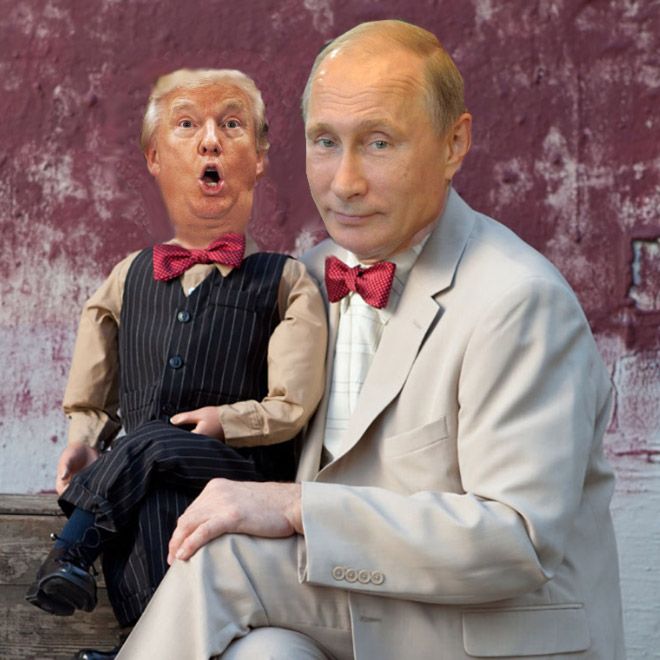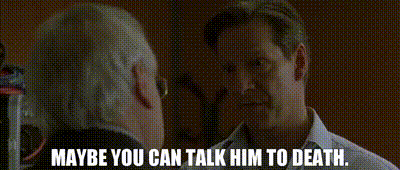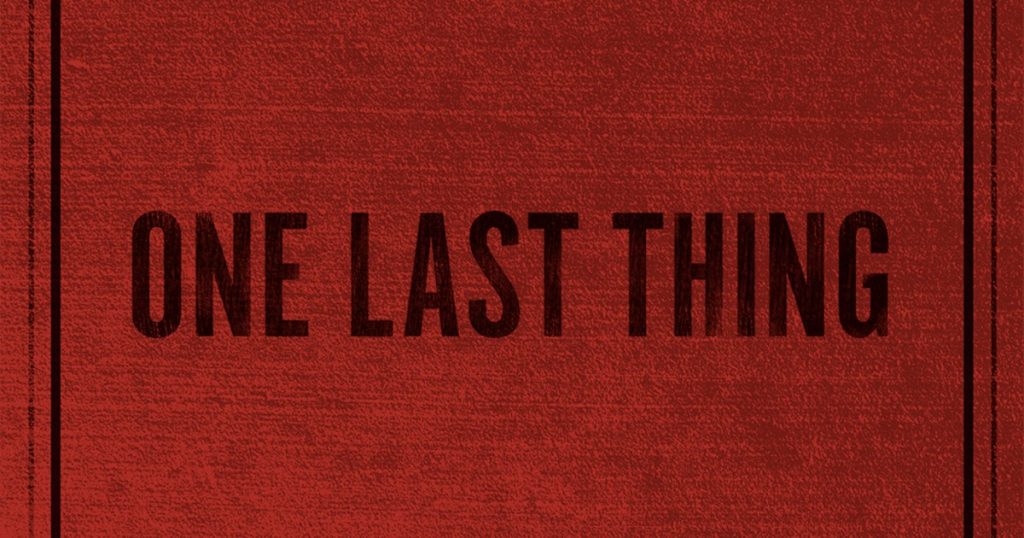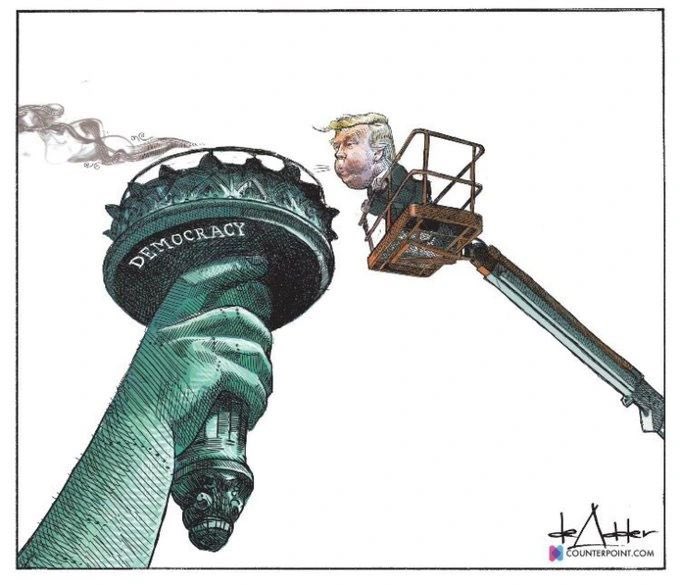Yesterday the White House publicly and officially switch sides on the Russo-Ukraine war. The United States surrendered any pretense of neutrality. Worse, it surrendered the all important position of moral clarity on the invasion.

19 February 2025 — It would be impossible to catalog everything that happened yesterday. So just some highlights from this most consequential day. The U.S. :
• Broke its promise to include Ukraine in negotiations by reaching an agreement with Russia at the expense of Ukraine
• Blamed the cause of the war on Ukraine, the victim of Russian aggression
• Furthered the Russian narrative questioning the legitimacy of the elected leader of Ukraine operating under constitutional government, and
• Blamed the destruction and murder of Ukrainians on Ukraine for not cutting a deal with Russia
Yes, we must acknowledge that everything is in flux with the White House. The same twists and turns which brought us to today, could veer in another direction tomorrow. A colleague told me “it is premature to abandon hope, and we must not set aside efforts at focused persuasion and pressure on Washington”.
Fine. Dream on. If the events, agreements and words of yesterday do stick, then February 18, 2025 will prove the most consequential day of the war – and the present world. It was the day that American leadership officially took an adversarial public stance towards Ukraine.
This makes the path forward for Zelensky extraordinarily difficult, and Europe will be of no help (see more on that below). If a Russo-American alliance now drives the “peace process,” Ukraine needs to make some very difficult decisions on whether to continue with the peace process. They are in a “damned if you do, damned if you don’t” scenario. Under any reality, the duly elected president of Ukraine must oppose the narrative emerging from the White House.
But he is fucked. We now realize that what Putin wanted in return when helping Trump become president was Ukraine. Losing Ukraine to an evil collaboration of Russia and the U.S. will only mean that the country will be robbed and cut to pieces like at a butcher.

But the Ukrainian crisis has led the EU to action! It is leading to new talks that will lead to … leaders talking. My contacts tell me discussions are underway about holding an extraordinary summit of the EU’s 27 member countries so that leaders can agree a definitive position on how to end Russia’s invasion of Ukraine. Since Trump’s bombshell decision last week to open negotiations with Moscow, most of the coordination of Europe’s response has been done in smaller groupings rather than the full European Council.
And French President Emmanuel Macron is right out there, convening another crisis summit today, after the disappointment of Monday’s hastily arranged gathering of European leaders on security and Ukraine.
But Macron’s talking shop with Giorgia Meloni, Donald Tusk, Keir Starmer and others on Monday did nothing to dispel the notion that Trump has abandoned Europe. Will his gab with the B Team change that? Erm, unlikely. And what about a full EU summit? Reuters reported that some countries were annoyed that Monday’s meeting wasn’t a full EU summit. But if Costa simply convenes a summit for the sake of it — without being able to reach a meaningful agreement — it risks plunging the mood in Europe even further into the icy depths.
And Europe still does not get it. It is still relying on American guarantees. While some participants at the Monday confab expressed a “readiness” to have a “direct involvement on the ground” to enforce a peace settlement, the EU Commission president von der Leyen said “there was a unanimous demand that these security agreements have to be backed up by the United States”.
But it grows worse as Trump is dividing Von der Leyen’s majority. There are signs of a new transatlantic dividing line between political factions in the European Parliament that supported the election of the new Commission. Last night, the leaders of the center-right EPP, the Socialists and Democrats, the liberal Renew Europe and the Greens signed on to a joint statement that says that Europe can “no longer fully rely on the United States to defend our shared values and interests,” as well as calling for a sharp uptick in efforts to boost defense.
Missing from the signatories: the right-wing European Conservatives and Reformists (ECR) group, whose members include Poland’s Law and Justice and Meloni’s Brothers of Italy. The ECR has regularly joined those groups in pro-Ukraine statements in the past, but a group spokesperson said: “We were not fully satisfied with the wording of the assessment of the United States in the text … Now is the time for calm, measured dialogue and a focus on pragmatic solutions.”
EU unanimity? Not . going . to . happen.
And on many levels, the bullshit continues. Why is Europe still measuring defense in GDP percentages instead of actual capability? Europe is at a brutal turning point. The security of Europe and its allies is at stake, and yet much of the defense conversation is still focused on percentages of GDP rather than real military readiness. It’s not just about spending – it’s about what that spending achieves.
Yes, Europe needs to invest more in defense, but what it really needs even more is faster action, better coordination, and real capability. Many European countries, including Denmark, have increased defense budgets – but where are the new soldiers, the ammunition, and the operational improvements? Funding announcements mean little if they don’t translate into real-world readiness.
GDP percentages don’t stop missiles. Budget increases don’t deter aggression if they don’t translate into real military power. Europe needs concrete improvements, not symbolic spending targets.
It’s time to shift the focus: readiness, capability, and action over empty commitments.
Huge issue. More in a subsequent post. But a few last points:
• It is difficult to understand how 27 European countries with some of the most developed economies in the world collectively fear a relatively underdeveloped Russia and struggle to unite in confronting the threat it represents.
• An interesting fact: the European Union’s GDP is estimated to be $20.29 trillion (nominal) in 2025, while Russia’s estimated GDP is about $2.2 trillion, which means it is roughly one-tenth the EU’s size.
• With a population of 450 million, the EU fears a war-mongering state with a population of 144 million, less than a third of the EU’s. Despite having cutting-edge weapon systems and well-trained militaries, the EU is reluctant to confront Russia. Despite their wealth and size, EU members have officially confirmed that they are not able to resist Russian aggression without assistance from the US.
• Meanwhile, Ukraine, with Western aid but only with a population of 30 million and a GDP smaller than that of any single EU state, has been fighting this aggressor for the past three years.
• This math doesn’t add up, and something is amiss here. Perhaps the political unwillingness, and the fact that the EU is now hopelessly divided.

There are huge, tectonic issues and movements at work here and they require a much more nuanced examination. This post is insufficient.
Because what we are talking about goes beyond democracy, and borders and military capacity. It is deeper, ike money, power, and the shifting tides of empire. Ukraine sits at the crossroads of Europe and Russia, a natural battleground for influence. It holds vast natural resources, including Europe’s largest uranium deposits, significant gas reserves, and the richest farmland on the continent.
But wars aren’t just fought over land – they’re fought over fear, control and ego. And both Trump and Putin have them in spades.
And as always, you need to follow the money. In the U.S., a corporatocracy has emerged that aims for a technological neo-feudalism. The technological unicorns are taking political power and are in the engine room of the White House guiding their puppet. They are in charge, liquidating democracy and the nation-state in all its expressions; and they are escalating it globally. The U.S. is today a competitor, an adversary and an enemy of Europe because Europe wants to regulate and bet on data privacy, and put an ethical code of emerging technologies and on digital rights. The U.S. corporatocracy says “No can do, Europe”.
The techno-corporatocracy is sweeping away all known culture with the stroke of the pen because they allow the role of the nation-states to be extinguished. Disguised as a classic sovereignist uprising combined with an exclusive nationalism, it emerges and faces the techno-cultural explosion of the Nanolithic. These recent technological oligarchies occupy the traditional power positions to undermine the cultural ethos; In fact, they are advocating breaking down cultural globalization and redefining its boundaries in 19th and 20th century political terms. They are stealing the future.

For the last few years we have had front row seats to watch the post-Cold War era get dismantled. Someday they will say of us that we were living in a strange time, the kind that usually follows revolutions or the decline of great empires. It was no longer the heroic fervor of midcentury upheavals, the glamorous vices of concentrations of power, or the skeptical soullessness and insane orgies of the latest bubbles.
It was an age in which despair and material comfort, technological wizardry and political malaise, and a paradoxical freedom, both from criticism and to endlessly criticize, were mixed together, along with deep but narrow enthusiasms, the renunciation of utopias, condescension toward the past, weariness of the present, and pessimism for the future.
We thought we were sublime. We thought we’d solved everything. But we were actually complacent. We had lost the thread of the story. We were sleep walking into the Apocalypse. It was the end of we knew not what, and so there was no real “we must put our house in order!!” because earth-shaking events had become the norm.
But, as I have said time and time again, we have forgotten our history – assuming anybody actually reads anymore. The arc of the moral universe does not bend toward moral progress and justice. Freedom, democracy, liberalism are mere blips on the screen of humanity. Autocracy, totalitarianism and dictatorships have long ruled the roost.
The emergence of liberal democracies was associated with ideals of liberty and equality that seemed self-evident and irreversible. But we know know those ideals were far more fragile than we believed. Their success in the 20th century depended on very unique social, political and technological conditions – that have now proved ephemeral, all now evaporated.
And America. It became a people with no shared narrative or history, so it was hard (impossible?) to keep a lid on disorder and violence. And so in its politics, nihilism has reigned supreme. I think “America” is a land that never existed, will never exist. It was an aspirational nation – not a real one.
Yes, American democracy may not have existed … but, boy, we’ll miss it now that it’s gone.
